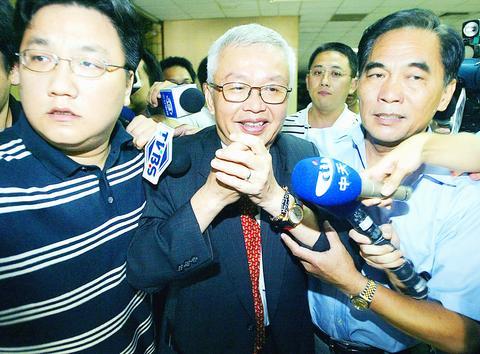Taipei Chief Prosecutor Hsueh Wei-ping (薛維平) yesterday wanted to detain former China Development Holding Corp chairman Liu Tai-ying (劉泰英) on charges of embezzlement and money laundering, but the Taipei District Court decided to let Liu go because of a lack of evidence.
Liu, who is president of the Taiwan Research Institute, was first interrogated by special agents from the Ministry of Justice's Bureau of Investigation at around 9:30am on Friday. At about 4pm, special agents transferred him to the Taipei District Prosecutors' Office for another interrogation by Hsueh.

PHOTO: LUO PEI-DE, LIBERTY TIMES
By about midnight, Hsueh believed that there was a good chance that Liu would destroy pieces of evidence or exchange information with crucial witnesses and filed a detention request.
The Taipei District Court began to review Hsueh's detention request at around 4am yesterday but finally decided to release Liu without bail at 8:20am.
As he was walking out of the court building, Liu said that he had an agreement with the judges that he would not comment on the case in public.
"I am quite tired now. Please understand that I am not supposed to comment on the case outside the courtroom. I gave the judges my word," Liu said.
Hsueh is currently investigating the disappearance in 1994 of US$4.5 million from a secret fund of US$10.58 million to secure Taiwan's diplomatic relationship with South Africa.
According to his investigation, the National Security Bureau paid the amount to South Africa to secure the diplomatic relationship between two countries on behalf of the Ministry of Foreign Affairs in May 1994.
On April 4, 1999, the ministry returned a total of US$10.7 million, including interest, to the bureau. The bureau's former chief accountant, Hsu Ping-chiang (
Liu Kuan-chun is wanted for allegedly embezzling more than NT$192 million from the total amount. According to the Bureau of Investigation, Liu left Taiwan on Sept. 3, 2000 and went to Shanghai. He surfaced in Bangkok in January last year and from there went to North America. Sources say that he is now in Canada.
Liu Tai-ying allegedly wired the money to Ruentex Corp Chairman Yin Yen-liang's (尹衍樑) bank accounts in the US and Singapore. Upon receiving the money, Yin allegedly wired it to one of the Ruentex Corp's bank accounts in Taiwan. Then, he "donated" US$3 million of it to the Taiwan Research Institute. However, prosecutors have not yet discovered the whereabouts of the missing US$4.5 million.
Hsu has been detained since July 18. In addition, prosecutors have also interrogated Yin, then-minister of foreign affairs Jason Hu (胡志強) and many other witnesses. According to Hsu's statement, he insisted that he acted on direct orders from former National Security Bureau secretary-general Yin Tsung-wen (殷宗文). The initial order allegedly came directly from former president Lee Teng-hui (李登輝).
Yin Tsung-wen died of adenocarcinoma, a kind of lung cancer, on March 28 this year.
As a result, whether Lee was involved in or knew of the crime is another mystery which prosecutors are trying to figure out.
Hsueh said that prosecutors may summon Lee if necessary.

Chinese Nationalist Party (KMT) Chairman Eric Chu (朱立倫), spokeswoman Yang Chih-yu (楊智伃) and Legislator Hsieh Lung-chieh (謝龍介) would be summoned by police for questioning for leading an illegal assembly on Thursday evening last week, Minister of the Interior Liu Shyh-fang (劉世芳) said today. The three KMT officials led an assembly outside the Taipei City Prosecutors’ Office, a restricted area where public assembly is not allowed, protesting the questioning of several KMT staff and searches of KMT headquarters and offices in a recall petition forgery case. Chu, Yang and Hsieh are all suspected of contravening the Assembly and Parade Act (集會遊行法) by holding

PRAISE: Japanese visitor Takashi Kubota said the Taiwanese temple architecture images showcased in the AI Art Gallery were the most impressive displays he saw Taiwan does not have an official pavilion at the World Expo in Osaka, Japan, because of its diplomatic predicament, but the government-backed Tech World pavilion is drawing interest with its unique recreations of works by Taiwanese artists. The pavilion features an artificial intelligence (AI)-based art gallery showcasing works of famous Taiwanese artists from the Japanese colonial period using innovative technologies. Among its main simulated displays are Eastern gouache paintings by Chen Chin (陳進), Lin Yu-shan (林玉山) and Kuo Hsueh-hu (郭雪湖), who were the three young Taiwanese painters selected for the East Asian Painting exhibition in 1927. Gouache is a water-based

Taiwan would welcome the return of Honduras as a diplomatic ally if its next president decides to make such a move, Minister of Foreign Affairs Lin Chia-lung (林佳龍) said yesterday. “Of course, we would welcome Honduras if they want to restore diplomatic ties with Taiwan after their elections,” Lin said at a meeting of the legislature’s Foreign Affairs and National Defense Committee, when asked to comment on statements made by two of the three Honduran presidential candidates during the presidential campaign in the Central American country. Taiwan is paying close attention to the region as a whole in the wake of a

OFF-TARGET: More than 30,000 participants were expected to take part in the Games next month, but only 6,550 foreign and 19,400 Taiwanese athletes have registered Taipei city councilors yesterday blasted the organizers of next month’s World Masters Games over sudden timetable and venue changes, which they said have caused thousands of participants to back out of the international sporting event, among other organizational issues. They also cited visa delays and political interference by China as reasons many foreign athletes are requesting refunds for the event, to be held from May 17 to 30. Jointly organized by the Taipei and New Taipei City governments, the games have been rocked by numerous controversies since preparations began in 2020. Taipei City Councilor Lin Yen-feng (林延鳳) said yesterday that new measures by